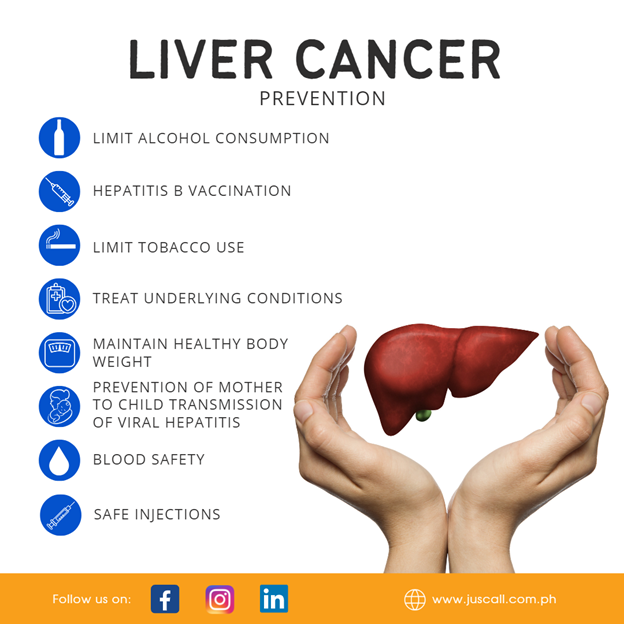Viral Hepatitis: The Leading Cause of Liver Cancer
For most, celebrating the holidays is never complete with alcohol paired by a staple, fatty “pulutan.” This season may be everyone’s excuse to take a break from a diet routine and indulge on extra bites of unhealthy foods and drinks. After all, “minsan lang naman ito,” they say. However, anything taken in excess especially when it comes food, carry risks to one of the essential organs in our body – the liver.
According to the Department of Health (DOH), the liver plays critical roles in digestion, nutrient processing, blood clotting, and fighting infections caused by viruses, bacteria, and other dangerous and damaging causes.
This January, the country observes liver cancer and viral hepatitis prevention and awareness month. Every year, more Filipinos are diagnosed with liver disorders, yet it continues to remain a “silent epidemic.” Experts believe that unhealthy lifestyle, heavily influenced by Western cuisine and habits, is one of the factors contributing to the rising numbers.
Liver cancer was the fourth most prevalent cancer type in the Philippines as of 2020, behind breast cancer, lung cancer, and colon cancer, according to the data from The Global Cancer Observatory (GCO) and the Hepatology Society of the Philippines. 10,594 new cases of lung cancer were reported in the nation during that same year, bringing the overall incidence for all ages and sexes to 153,751 with a crude rate of 140.3. In the Philippines, men had a 17.8% incidence rate of liver cancer, compared to 6.1 for women. This indicates that men are more likely than women to develop liver cancer, according to the World Cancer Research Fund.
What causes Liver Cancer?
Infection with the Hepatitis B virus accounts for more than half of all liver cancer cases in the Philippines. 10% of Filipinos have Hepatitis B, while 0.6% have Hepatitis C. Other causes, according to the Mayo Clinic, includes Genetics, Alcohol abuse/cirrhosis, inherited liver diseases such as hemochromatosis and Wilson’s disease, Non-alcoholic fatty liver disease, Exposure to aflatoxins (poisons produced by molds which can grow on crops that are poorly stored), Obesity, and Type 2 diabetes.
What is the link between Hepatitis B or C and Liver Cancer?
Inflammation and liver scarring are results of Hepatitis B or C virus infection. Cirrhosis, the most severe kind of scarring, can then result in the growth of liver cancer. The same treatment is used to treat liver cancer from various causes as well as liver cancer brought on by the Hepatitis B or C virus. However, many liver cancer cases in the Philippines are found in the late stages when it is either impossible or ineffective to cure them. Therefore, preventing the onset of liver cancer and its consequences in people with Hepatitis B or C infection is a crucial component of the treatment of these individuals.
What are the signs and symptoms to watch out for?
Signs and symptoms of liver cancer normally do not appear until the disease is advanced, but they might appear sooner, in some cases. If you visit the doctor as soon as you start experiencing symptoms, your cancer may be discovered sooner, when treatment is most likely to be beneficial. Some of the typical signs of liver cancer are:
- unintentional weight loss
- loss of appetite due to the malfunction of the liver in the digestive system
- nausea and vomiting
- persistent general weakness and fatigue
- upper abdominal pain (usually on the right side or near the right shoulder blade)
- abdominal swelling due to fluid build-up
- jaundice or yellow discoloration of skin and whites of the eyes
- white, chalky stools

Prevention and Cure
Patients with liver cancer have better survival rates when the disease is caught early. Some of the tests and procedures that can aid in the diagnosis of liver cancer include blood tests, imaging exams, and removing a sample of liver tissue for examination. For those already infected with Hepatitis B or C, early identification of liver cancer through screening and surveillance using hepatic ultrasound and a blood marker called alpha-fetoprotein performed every 6 months is strongly recommended.
The Department of Health (DOH) advises the following self-care and prevention measures to prevent liver cancer:
- cut back or abstain from alcoholic beverages
- limit or quit tobacco use
- maintain healthy body weight through a balanced diet and regular exercise to prevent fatty liver
- seek treatment for underlying conditions which may cause liver cancer or other complications

Available treatments in the country, according to Makati Medical Center, include:
- surgery to remove the affected area in the liver to stop the growth and spread of cancer
- localized treatment including radiofrequency ablation, cryoablation, alcohol injection, chemoembolization, and radiation
- targeted drug therapy
- chemotherapy
- radiation therapy
- supportive (palliative) care
- liver transplant
Avoiding Hepatitis B or C infection is the single most crucial step in preventing liver cancer. An effective vaccine for Hepatitis B is already available. According to Republic Act 10152, all newborns must receive the Hepatitis B vaccine within 24 hours of birth. The PhilHealth Newborn Care Package includes a free infant hepatitis B immunization offered by the DOH. Since there is no vaccine yet for hepatitis C, prevention of infection focuses on lowering the risk of exposure to the virus in medical facilities and among high-risk groups.
References:
Baclig, C. E. (2022, January 19). Liver cancer, diseases: A silent epidemic in PH | Inquirer News. INQUIRER.net. https://newsinfo.inquirer.net/1542084/liver-cancer-diseases-a-silent-epidemic-in-ph
Labordo, N. A. (2021, January 25). Liver Cancer and Viral Hepatitis in the Philippines: A Silent Epidemic. National Nutrition Council. https://www.nnc.gov.ph/regional-offices/visayas/region-viii-eastern-visayas/4647-liver-cancer-and-viral-hepatitis-in-the-philippines-a-silent-epidemic
Ong, J. (2021, January 26). Liver Cancer and Viral Hepatitis: Prevention is the Key. The Medical City. Retrieved December 28, 2022, from https://www.themedicalcity.com/news/liver-cancer-and-viral-hepatitis-prevention-keySigns and Symptoms of Liver Cancer. (n.d.). https://www.cancer.org/cancer/liver-cancer/detection-diagnosis-staging/signs-symptoms.h
